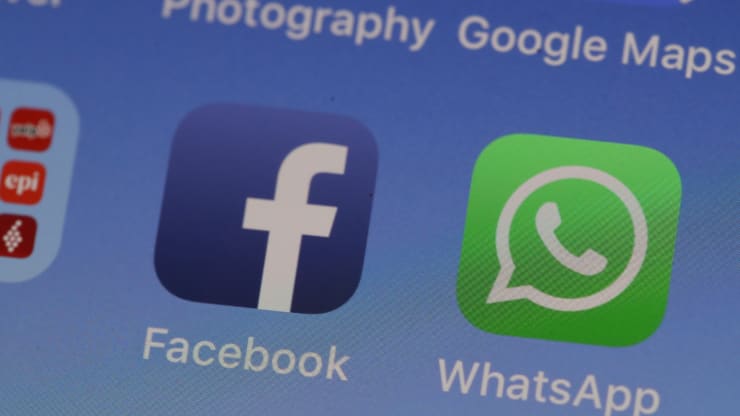India’s technology ministry has asked Facebook-owned messaging giant WhatsApp to withdraw planned changes to its privacy policy that has drawn widespread backlash, multiple media outlets reported.
In an email addressed to WhatsApp chief Will Cathcart datedJan. 18, the Ministry of Electronics and Information Technology said the proposed changes raised “grave concerns” over the implications for choice and autonomy of Indian citizens, Reuters reported.
The update relates specifically to features that allow users to interact with businesses on WhatsApp.
The ministry reportedly said it was worried about the lack of choice Indian users had over opting out of WhatsApp’s planned policy update compared with those in Europe, where data protection rules are more stringent. The tech ministry reportedly called it “discriminatory treatment” that “betrays a lack of respect for the rights and interest of Indian citizens.”
“Therefore, you are called upon to withdraw the proposed changes,” the ministry reportedly wrote, according to Reuters. The news wire added that the ministry has asked WhatsApp to respond to 14 questions including the kind of user data it collected, if it profiled users based on their usage habits and on cross-border data flows.
A WhatsApp spokesperson told CNBC in a statement, “We wish to reinforce that this update does not expand our ability to share data with Facebook.”
“Our aim is to provide transparency and new options available to engage with businesses so they can serve their customers and grow. WhatsApp will always protect personal messages with end-to-end encryption so that neither WhatsApp nor Facebook can see them,” the spokesperson said.
What is the update about?
WhatsApp first talked about the changes in October, saying businesses could manage their chat logs with customers by storing them on Facebook’s hosting services. Businesses can see the contents of messages users send them on WhatsApp and may use that information for marketing purposes, which could include advertising on Facebook.
The backlash was widespread, spurred partly by misinformation online. People were confused and worried if the updated privacy policy signaled broader data sharing arrangements between WhatsApp and Facebook. That spurred a surge in downloads for rival apps Signal and Telegram. Since 2016, WhatsApp has shared some data with its parent company.
WhatsApp later said that the update will not change the end-to-end encryption of personal conversations, meaning the app and Facebook will still be unable to view private messages. WhatsApp also said it does not share people’s contacts with Facebook.
WhatsApp was due to start prompting users on Feb. 8 to accept those updated terms to continue using the app. Since then, the Facebook-owned app said it would delay the enforcement of its planned policy update until May 15 to give people more time to “review the policy at their own pace.”
India is a massive market for WhatsApp
India is one of the largest markets for WhatsApp with more than 400 million users. The company’s plans for the country extend beyond just messaging — starting last year, users can send money through the app.
“It has become a platform for many things. Small businesses and corporations are using WhatsApp to conduct commerce, payments and sharing of payroll data,” Abishur Prakash, a geopolitical specialist at the Center for Innovating the Future (CIF), a Toronto-based consulting firm, told CNBC by email. “This makes WhatsApp, an American service, a new kind of infrastructure for doing business in India.”
The stakes for WhatsApp in India are very high, according to Prakash. He explained that there is a possibility the messaging giant may change its policy “because of the strategic position India holds in its strategy.”
When seen through the lens of tech sovereignty and data, New Delhi wants to establish its own data borders after pushing for an open data marketplace where large tech firms share information with Indian companies, Prakash said. “This makes the new WhatsApp policy counter to the direction New Delhi is moving in.”
On Tuesday, India’s technology minister Ravi Shankar Prasad had a few choice words for Facebook, WhatsApp and other tech companies operating in the country.
“Be it WhatsApp, be it Facebook, be it any other digital platform, you are free to do business in India,” he said, speaking at a virtual event. “But do it in a manner without impinging upon the rights of Indians who operate there.”
“And, the sanctity of personal communications needs to be maintained,” he added. “I know there will be pressure for sharing of (data, but) this is plainly unacceptable.”
Latest Stories
-
DAMC, Free Food Company, to distribute 10,000 packs of food to street kids
38 minutes -
Kwame Boafo Akuffo: Court ruling on re-collation flawed
58 minutes -
Samuel Yaw Adusei: The strategist behind NDC’s electoral security in Ashanti region
60 minutes -
I’m confident posterity will judge my performance well – Akufo-Addo
1 hour -
Syria’s minorities seek security as country charts new future
2 hours -
Prof. Nana Aba Appiah Amfo re-appointed as Vice-Chancellor of the University of Ghana
2 hours -
German police probe market attack security and warnings
2 hours -
Grief and anger in Magdeburg after Christmas market attack
2 hours -
Baltasar Coin becomes first Ghanaian meme coin to hit DEX Screener at $100K market cap
3 hours -
EC blames re-collation of disputed results on widespread lawlessness by party supporters
3 hours -
Top 20 Ghanaian songs released in 2024
3 hours -
Beating Messi’s Inter Miami to MLS Cup feels amazing – Joseph Paintsil
4 hours -
NDC administration will reverse all ‘last-minute’ gov’t employee promotions – Asiedu Nketiah
4 hours -
Kudus sights ‘authority and kingship’ for elephant stool celebration
4 hours -
We’ll embrace cutting-edge technologies to address emerging healthcare needs – Prof. Antwi-Kusi
4 hours

